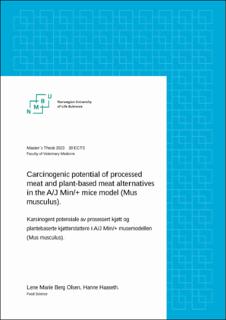Carcinogenic potential of processed meat and plant-based meat alternatives in the A/J Min/+ mice model (Mus musculus).
Abstract
Colorectal cancer (CRC) is one of the most common cancers both worldwide, and in Norway, with high mortality rates. The risk of developing CRC has been associated with diet and lifestyle, where, according to IARC, red and processed meat are classified as probably carcinogenic and carcinogenic to humans, respectively. Multiple theories of the relationship between CRC and meat have been studied, however, the causality and underlying mechanisms are yet to be documented.
CRC arises mostly by somatic mutations (70%), with a mutation in the tumor suppressor gene adenomatous polyposis coli (APC) playing an initiating role of carcinogenesis. Some cases are however caused by germline mutations in the APC gene, such as the inherited condition familial adenomatous polyposis (FAP). Multiple intestinal neoplasia (Min/+) mice model has previously been established as a human model for studies on colorectal carcinogenesis.
The overall aim of the present study was to investigate the carcinogenic potential of experimental diets prepared from commercially available processed meat –and plant-based meat alternatives in the A/J Min/+ mouse model. An inbred colony of A/J mice heterozygous for the Min trait (Min/+) were included in this study and were randomly recruited into 4 experimental groups at 4 weeks of age. The experimental diets were based on commercial processed meat -and plant-based meat alternative products (hot dog, hamburger and vegan burger). The mice were exposed to experimental diets for 9 weeks before termination. Lesions in the small intestine (SI) and colon were scored after staining and fixation using a light microscope.
We found a carcinogenic initiating potential of the hot dog in the SI. The reference diet exhibited a promoting effect on the SI and colon, as well as an initiating potential on the colon. However, a promoting potential on the colon was also found in the vegan diet. In the colon, gender-specific differences in carcinogenic potential were found. The hot dog diet and the reference diet exhibited an initiating potential in males and females, respectively. Moreover, the vegan diet showed a promoting potential in males.
Altogether, we revealed a carcinogenic potential of not only processed meat products but also processed meat alternatives. However, further research is needed to understand the complex interplay of dietary, genetic and lifestyle factors on carcinogenesis and the underlying mechanisms.
